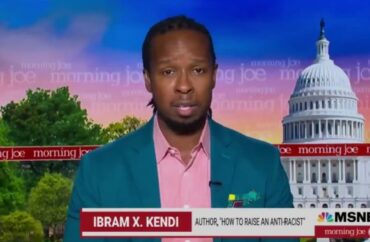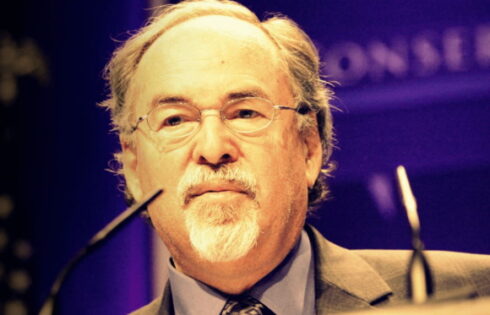
ANALYSIS: Hispanic and Asian males are underrepresented at the book festival
Professor Ibram Kendi’s “Antiracist Book Festival” has a racism problem – it failed to feature enough Hispanic and Asian males.
This violates his own “antiracist” principles which state that, except for white people, there must be exactly equal distribution of opportunities among racial groups. This is not the first time The College Fix has identified racial distribution problems with Kendi’s work.
The College Fix analyzed data from the three Antiracist Book Festivals hosted by Boston University Professor Kendi, who popularized the term “antiracist.” American University hosted the first one in 2019 when Kendi taught there.
There have been two more since then, in 2021 and 2022.
The Fix found that while Asian males are approximately 3.5 percent of the population, they represented only two percent of the featured authors. Furthermore, while Hispanic males are 9.5 percent of the population, they represented only three percent of the featured authors.
By contrast, black females were overrepresented, grabbing 40 percent of the slots at the book festival in the three years it occurred. Yet black females comprise only 6.5 percent of the population.
“A racist policy is any measure that produces or sustains racial inequity between racial groups,” according to Kendi.
“By policy, I mean written and unwritten laws, rules, procedures, processes, regulations, and guidelines that govern people,” he wrote in “How to be an Antiracist.”
“If discrimination is creating equity, then it is antiracist,” he wrote in the same book. “If discrimination is creating inequity, then it is racist.” “There is no such thing as a nonracist or race-neutral policy,” Kendi wrote. “Every policy in every institution in every community in every nation is producing or sustaining either racial inequity or equity between racial groups.”
He wrote further:
I do not think an organization should hire an incapable candidate solely because of that candidate’s race, which is how positive discrimination is sometimes defined. But I do think organizations and societies should support practices that seek to remedy inequities…
This presumably explains the underrepresentation of white males and females. White females were only five percent of the featured authors, despite being 36.5 percent of the population. White males fared slightly better, comprising eight percent of the featured authors.
Boston University and the Center for Antiracist Research did not respond to multiple requests for comment in the past month.
The Fix emailed center spokeswoman Tami Nguyen and university spokesman Colin Riley three times in the past month and asked if it is fair to call the book festivals racist and if Kendi has a explicit animus or implicit bias against Asian and Hispanic males. The Fix also asked what steps could be taken for future book festivals to ensure equitable distribution, such as an equity audit.
Riley also did not respond to a voicemail reminder last week. The Fix also asked if the center is still under investigation and if there would be a book festival in 2024.
A BU audit last year cleared the center of financial improprieties, but it was also going to look into the culture at Kendi’s think tank, following complaints from staff and professors.
Black leader suggests Kendi believes in ‘acceptable racism’
Kendi’s history of racial inequity and his promotion of “antiracist” ideas drew criticism from Donna Jackson, a leader with the National Center for Public Policy Research.
“The theory that he gives is misleading,” Jackson said on a phone call with The Fix, calling it “anti-white.”
“He’s okay with the disproportionate impact to other minorities, the whole focus is really just about punishing white Americans,” Jackson said. She is “the director of membership development for the Project 21 black leadership network,” according to her bio.
There is “acceptable racism,” for Kendi, according to Jackson.
“Acceptable racism is, ‘it’s okay if an African-American bumps an Asian-American for a position, it’s okay if an African-American bumps a Hispanic American,” she said.
“It’s okay if he disproportionately discriminates against Hispanic and Asian authors, that’s okay [to Kendi], it’s only unacceptable for him if he feels like there’s a disproportionate impact to African-Americans.”
She said the “present climate” favors black Americans and she has seen “many situations,” where Asians have had to overcome hurdles not in the way of black Americans.
Kendi doesn’t even consider discrimination against Hispanics and Asians to be “racism,” Jackson suggested.
Kendi’s center has a history of not practicing the racial equity ideas it preaches – a previous Fix analysis found black and Hispanic employees bore most of the burden of layoffs from the center.
The current staff and advisory board also does not feature any Native Americans and only one Hispanic member, a June analysis concluded. Yet, Kendi is quick to accuse others of racism for questioning his leadership.
He also has advocated for a new federal “Department of Anti-racism” “responsible for preclearing all local, state and federal public policies to ensure they won’t yield racial inequity.”
The department would also “monitor those policies, investigate private racist policies when racial inequity surfaces, and monitor public officials for expressions of racist ideas.”
MORE: Kendi hasn’t published a new paper in four years, 2023 analysis finds
IMAGE: MSNBC/YouTube
Like The College Fix on Facebook / Follow us on Twitter






Please join the conversation about our stories on Facebook, Twitter, Instagram, Reddit, MeWe, Rumble, Gab, Minds and Gettr.